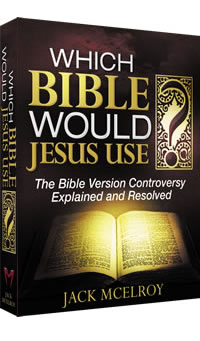How The New King James Bible Creates Doubt
- Issue Date: July/August 2000
When you begin to disciple a new Christian, don't you always tell him that the Bible is God's word and he can trust it above all else? Of course you do.
But if your church is like many others, you may give him a New King James Bible because you think it is easier to read. And in so doing you will plant the seeds of doubt.
In his book, Defending the King James Bible, D.A. Waite explains:
"The diabolical nature of the NEW KING JAMES VERSION shows itself in their printing all the various readings of the Greek text in the footnotes. They print all sides and take their stand in favor of none of them. By so doing, they confuse the readers."
So now this young Christian has to make a decision. You gave him a Bible and said this is God's Word. But that very Bible says God's Word may mean this or it may mean that, he must decide. Waite goes on to explain:
"But the NEW KING JAMES makes note of all the changes so that the new Christian, the young Christian, and all other Christians are supposed to be textual critics on their own, and make up their own mind about the proper Greek text."On page 1235, in the back of the book, the editors make that very statement. They wrote:
'It was the editors' conviction that the use of footnotes would encourage further inquiry by readers. They also recognized that it was easier for the average reader TO DELETE [subtract, or take away from] something he or she felt was not properly a part of the text than to INSERT a word or phrase which had been left out by the revisers.'"
"So they say the editors have no opinion, no guess as to what the real text of the Word of God is. You take your pick and choose for yourself. To have a smorgasbord of textual variance down in the footnotes, as the NEW KING JAMES has, is a terrible travesty on the young Christian trying to find out what the Bible says. It certainly puts doubts in the mind whenever there's a difference. Which is right? Is it this reading or that one? No matter which you pick, you have a question mark and a doubt; and the Devil is delighted!"
The bottom line is this: we need to study the historical evidence, decide which text is exactly God's Word, and stick with it. This is the text we need to provide young Christians. And it would certainly help to get the right one - the Received Text. Any Bible version with alternate readings will make the reader have to decide what God really meant. How can you trust Bible translators who can't make up their mind what God really said?
- See more articles on related topics:
- Bible Versions
- New King James Version (NKJV)
- Changes in Bible Versions
Other Articles from July/August 2000:
- Aborted Baby Parts For Sale
- Author Claims Some Dinosaurs Live Today!
- Pope Thanks Fatima Goddess Again for Saving His Life
- Jesus' Own Claim to be the Son of God
Brings Muslim to Christ
- Chick Mail Bag - July 2000
- The Greatest Miracle of this Generation
- Prison Ministry Letters: July-2000
- 'Chopped-up Comic' Still Leads Prisoner to Christ
- Tract Passing Tips - July 2000
- Native Americans Now Have Their Own Chick Tract
More on Bible Versions:
Products of Interest:
-

New King James - The Bridge Bible
It is NOT a King James Bible! It promised to be a 5th edition of the KJV, preserving "the originally intended meaning of every verse." But that's not what happened.
-

Which Bible Would Jesus Use?
342 pages
Everyone's got an opinion as to which Bible is best. If Jesus walked into your church, which Bible would He quote from? -

Answers to Your Bible Version Questions
224 pages
David W. Daniels answers difficult questions about the KJV. Learn how to defend the KJV and why you can trust it. -

Look What's Missing!
256 pages
For years, publishers have been removing words, and even whole verses, from modern Bibles. What's missing from your Bible? Take a look! -

Why They Changed the Bible
228 pages
See who is behind the gradual changing of modern Bibles. There’s no guessing about what these people believe. They will tell you, in their own words!



